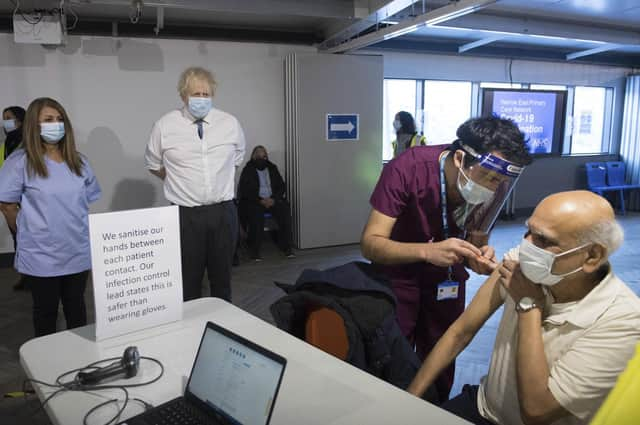Covid vaccines: We have been extremely lucky but may not be when the next pandemic strikes – Professor Eleanor Riley


So far, pretty much every approach that has been taken to develop a vaccine against Covid-19 has worked, and these approaches are very different.
For example, mRNA vaccines encase the genetic code of the virus spike protein in fat droplets, called liposomes, to trick our own cells into making the protein so that we make antibodies and T cells to fight off the virus if we are subsequently infected.
Advertisement
Hide AdAdvertisement
Hide AdViral-vectored vaccines use a harmless virus to carry the same genetic code and similarly trick our cells into making the spike protein. Other vaccines use a synthetic version of the spike protein itself or a killed version of the whole Sars-CoV-2 virus to stimulate our immune system.
It may turn out that some of these vaccines work better in some people or against some variants of the virus, or are better at preventing virus transmission. But, for now, they all seem to be highly effective at preventing severe disease, hospitalisation and death.
In the short term that should be enough to get us out of this dreadful cycle of escalating cases, illness, death, lockdown, temporary release of restrictions and then back into lockdown and death.
Contrast this with the decades of research trying, in vain, to develop vaccines for HIV, malaria, tuberculosis and myriad other “neglected” diseases that cause disease, death, disability, disfigurement, stigma and poverty in desperately poor communities around the world.
Our failure to develop effective vaccines against these “diseases of poverty” is partly about political will – these diseases are either not endemic in rich countries or we have been able to manage them in other ways – but, crucially, it is also about biology.
These are “difficult” diseases, caused by complex organisms that have co-evolved with humans and other primates for millennia, probing the weaknesses in our immune defences and finding ways around them.
By comparison, Sars-CoV-2 was a pushover. It is a relatively simple organism (comprising just 12 proteins compared to the over 5,000 proteins in the organism that causes malaria, for example).
Sars-CoV-2 has only very recently colonised humans and has few defences against our immune systems (although the emerging variants suggest that such defences may evolve).
Advertisement
Hide AdAdvertisement
Hide AdIt is also very similar to viruses we had seen before (such as Sars and Mers) and had begun making vaccines for, giving us the tools, know-how and confidence to move quickly without cutting corners.
Some of our worst fears – including that the vaccines themselves might trigger severe disease, as is seen for some other viral vaccines – have not materialised. Long-term surveillance for adverse side-effects is ongoing but, so far, these vaccines appear to be very safe.
So, yes, as far as vaccines are concerned, we have been extremely lucky this time. There is absolutely no guarantee that we will be so lucky next time, and there will be a next time.
Eleanor Riley is professor of immunology and infectious diseases at the University of Edinburgh
A message from the Editor:
Thank you for reading this article. We're more reliant on your support than ever as the shift in consumer habits brought about by coronavirus impacts our advertisers.
If you haven't already, please consider supporting our trusted, fact-checked journalism by taking out a digital subscription.
Comments
Want to join the conversation? Please or to comment on this article.